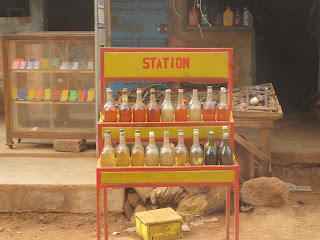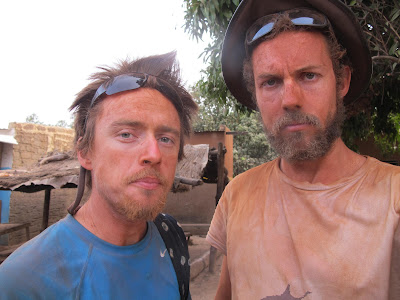Being a slave was pretty kak. One minute strolling through
the fragrant forests somewhere in West Africas interior, the next in a dark
cell where the only thing in shorter supply than sunlight was toilet paper.
Then it was to the bowels of an imperial frigate where the captain wore a
wide-brimmed hat and knicker-bocker trousers and had little sense of humour about
either of these. Nor about his human cargo below, about which he accepted the
fact that one in three probably wouldn’t make it out the other side. Those lucky ones that did were deposited in
spots where sugarcane was plentiful and human rights were not. Like Cuba. And
the Caribbean. The really unlucky ones ended up in Americas deep south where
their life of servitude was made all the more unbearable for having to suffer
all their instructions from men similar in disposition and accent to George
Bush. This may have been the straw the broke the camels back.
Ghanas dynamic postcard of a coastline houses three-quarters
of all the slaving forts used by the Portuguese, Dutch, French and English for
their trade between the years 1550 and 1850 when Steven Spielberg released
‘Amistad’ and the trade was forcefully abolished. And therein lies a strange
contradiction: that these massive forts, home to so much suffering for so long,
sit along a coast where tourists now flock to to escape the shackles of their
daily lives. Its difficult to fully picture the horrors housed within these
monuments when the café downstairs offers such damn good Pina Coladas. Or when
the American with the pink tee-shirt stating he is, infact, a ‘Love Machine’
keeps interrupting the guide with inane comments like:
“You say slavery has been abolished. But has it?’
‘Yes’
‘But has it?’
‘Yes’
‘Really though. Has it?’
‘Yes. Watch Amistad.’
The only thing he could possibly have been referring to is
the servitude of the Ghanaian men in the face of their ferocious women. The
females here rule with an iron fist that send their happy-go-lucky male
counterparts cowering and begging not be sent to the naughty corner for a
smack. In the markets you buy what they tell you to buy and you offer double their
quoted price just to escape their vengeful wrath. This brow-beating seems to
have manifested in these poor males in the unusual form of homophobia. When out
of ear-shot of their irate spouses and therefore happy to venture an opinion,
these fellows will always – without exception – bring up the sticky topic of
gay rights. In a particularly bizarre exchange we were informed, in no
uncertain terms, that Jay-Z is a gay freemason, Michelle Obama is barking up
the wrong tree with Barack and even poor old haggard Queen Elizabeth was ‘the
biggest lesbian of all’.
So it is quite unfortunate that even here in Ghana – where
the slaving system was its most ferocious – the people still seem particularly
shackled by their prejudices. It would be a real pity if all we got out of
three hundred years of intensive slavery and the better part of twenty million
deaths was good rum and sweetened Nescafe. And a particularly moving
performance from Anthony Hopkins. But alas it seems so.







.JPG)
















